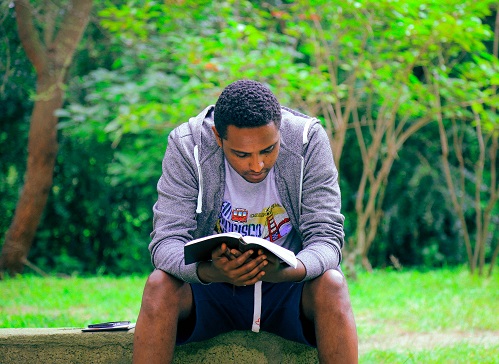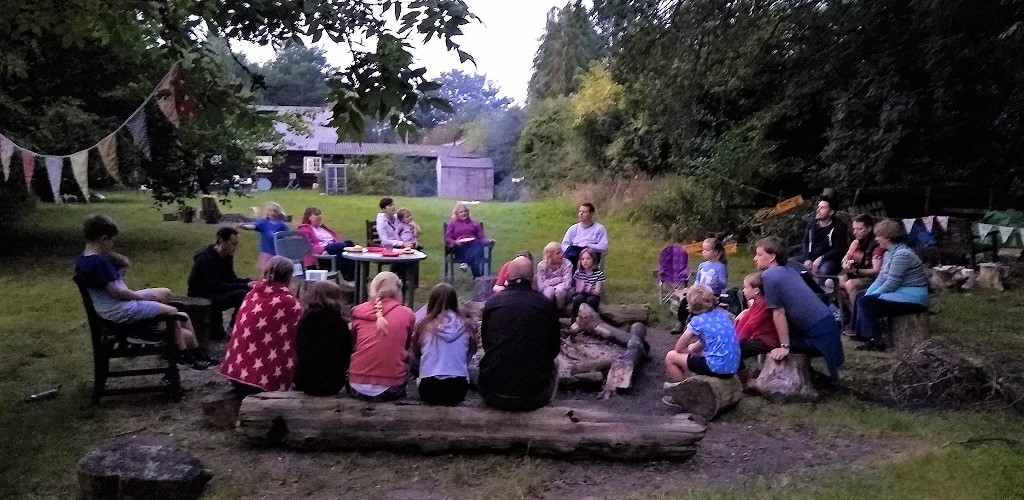An outdoors faith
God created us to live in a garden. But we spend most of our time indoors.
Yes, I know, some of that has to do with the British climate. But so many jobs now involve sitting at a desk in front of a screen. And then how do you spend your evenings – in front of the TV/laptop/smartphone? When I lived in China, it was normal to see older people out doing tai chi each morning and spending their evenings playing board games or social dancing in the parks; meanwhile in the UK we have an epidemic of loneliness. Our culture can be very individualistic and isolating. Depending on where you look you will find different averages of how many hours modern children spend in front of a screen (and how few they spend in unstructured outdoor play), so I won’t quote them, but even the most optimistic stats are depressing. I’ve spent the couple of years intentionally clocking my boys’ hours outside using tracker sheets from the brilliant 1000hoursoutside.com. It’s a good motivator, but it has shocked me how hard it is to clock up those hours. Modern life domesticates what should be wild!
But does this disconnect with the great outdoors matter? And why, particularly, does it matter to me as a Christian?
Houses weren’t in the original design
Let’s go back to The Beginning. Whether you’re a 7-day creationist or see the Genesis narrative as more of a poetic picture of God’s creation of the earth, most Christians would agree that Genesis gives us some key messages – truths about God, the earth and mankind:
-
God, through his Word (Jesus), created everything out of nothing
-
It was all exquisitely designed to function interdependently (beautifully reflecting the relationships within God himself) and he called it GOOD.
-
When he made people, he said they were in his image and very good
-
We were meant to live in a perfect garden (and not to need clothes!)
-
He made us for community – the only thing “not good” was for man to be alone (Gen 2:18)
-
Mankind was given a job – actual work – before the Fall (not all work is a result of the Fall and therefore bad, though our attitude to it has certainly changed, as has the level of struggle!).
This work was gardening.
Gardeners or tyrants?
Mankind, as a special bearer of the image of God, was given extra responsibility for the care of creation. But the way we have worked out this role since the Fall, and particularly since the industrial revolution, looks to have been influenced by an unhelpful reading of Genesis 1:28:
And God blessed them. And God said to them, “Be fruitful and multiply and fill the earth and subdue it, and have dominion over the fish of the sea and over the birds of the heavens and over every living thing that moves on the earth.” (ESV)
Ellen F Davis explains:
The common translation “have dominion over” is problematic, above all because “dominion” is so readily confused with “domination.” Since the Renaissance, Gen 1:26 has frequently been invoked in the West to support the project of “conquering,” “commanding,” or “enslaving” nature through scientific and technological means. Another difficulty with the common translation is that the Hebrew phrase (radah b-) includes a preposition that is in most cases not equivalent to the English preposition “over.” A more satisfactory translation of that crucial verse might be “Let us make humankind in our image, according to our likeness, so they may exercise skilled mastery among [or, with respect to] the fish of the sea and among the birds of the air.” These are the same creatures that were specially blessed by God—“Be fruitful and multiply” (Gen 1:22)—on the fifth day of creation, before humans were created. We fulfil our role in the created order only when we recognize our responsibility to help perpetuate other creatures’ fruitfulness.
It is also helpful to look at Genesis 2:15 –
The Lord God took the man and put him in the garden of Eden to work it and keep it. (ESV)
The Hebrew words used are
abad meaning tend, work, serve, till, cultivate (with a nuance implying adornment, embellishment), and
shamar meaning keep, exercise great care over. (No Hebrew scholar myself, I am informed by
Richard T Ritenbaugh).
This makes it clear that Genesis 1:28 was not about us dominating and doing what we liked with the earth; it was not about us forcing the earth to serve us, but instead our entering into God’s plans for order and harmony, tending to and further beautifying his garden,
encouraging further fruitfulness.
Do you hear that? Even though all God’s ways are good, all creatures were perfectly provided for and his creation didn’t need
improvement, he made his people creative like him, and so he gave us the opportunity to work with the bountiful resources he had created, expressing our own creativity within them. God is outside of time and knows where human nature will lead (and had planned for that!) but when he gave us this creativity, I imagine he was looking forward to things like topiary and beautiful vegetable and flower gardens, not battery farms or plastic toys.
A roofless narrative
Even though the perfect Eden became off limits when sin entered history, people were still outdoors and intimately connected to the land. God’s people lived in tents for generations, they slaved in the hot sun in Egypt, kept animals and worked the land. They knew what abundance and famine felt like. Sometimes I think we don’t have enough soil under our fingernails to read the Bible correctly, and here’s someone who agrees with me:
“I don't think it is enough appreciated how much an outdoor book the Bible is. It is a "hypaethral book," such as Thoreau talked about - a book open to the sky. It is best read and understood outdoors, and the farther outdoors the better. Or that has been my experience of it. Passages that within walls seem improbable or incredible, outdoors seem merely natural. This is because outdoors we are confronted everywhere with wonders; we see that the miraculous is not extraordinary but the common mode of existence. It is our daily bread. Whoever really has considered the lilies of the field or the birds of the air and pondered the improbability of their existence in this warm world within the cold and empty stellar distances will hardly balk at the turning of water into wine - which was, after all, a very small miracle. We forget the greater and still continuing miracle by which water (with soil and sunlight) is turned into grapes.” - Wendell Berry, The Art of the Commonplace: The Agrarian Essays
Our disconnect from the natural world means we miss its reminders of God’s abundant creativity and provision, so when we read Jesus’ words about the sparrows/flowers/seeds/weeds/mountains we don’t have the frame of reference that his audience would have had even 150 years ago.
What were your ancestors doing in 1871? Chances are they didn’t sit at a desk all day but had a physical craft (my great grandparents were gardeners, carpenters, blacksmiths, farm labourers, builders, had cottage industries). I bet they knew how to grow vegetables, forage for seasonal food and use herbal remedies. They had a more intimate understanding of weather and seasons because they didn’t have tumble driers, cars, electric light, or fruit flown in from hot climes!
Meet God outdoors
Now, I’m not saying you should all go out and get an allotment, but if you have the opportunity to try growing a few vegetables, please take it. Because what I thought I knew about the teachings of Jesus have taken on a completely new life in me since I started spending all those hours toiling against thorns and thistles, weeds, birds and unexpected frosts 7+ years ago. And I don’t look at the food in the shops the same way now I know the complexities of producing it.

But you don’t have to become a gardener to reconnect with creation. Why not go outside to read your Bible this week? Grab a warm coat, a reusable travelling cup and take the Word for a walk in the woods, or sit on a hill, or even just on your front doorstep. In the OT, much emphasis is put on the Temple – yet most of the great God encounters recorded actually happened outside.
-
Abram stargazing?
-
Jacob dreaming with a rock for a pillow?
-
Moses at the burning bush, following a pillar of cloud or fire, and up a mountain while lightening flashed?
-
Elijah in front of the cave?
-
Angels visiting the shepherds?
-
Jesus’ baptism in the river?
-
Paul on the road to Damascus?
You get the picture. If you’ve ever had a special encounter with God, I wonder where you were?
This is why I was so excited to be able to set up our first FamilyFest at the start of September – to camp out with WBC friends, do forest church, barbecue and worship round a campfire. We are hoping to do it again next year, perhaps early summer. Please get in touch if you’d like to help us plan!

If you recognise that your family are spending too much time indoors and on screens, why not make a date to meet up for a walk with friends from WBC in the next week, maybe along the Thames or up at Wittenham Clumps? You won’t regret a single hour you choose to drag yourself outside for a walk or choose to have your cup of tea in the garden listening to the birds. Even in Autumn and Winter. It will boost your mental and physical health, and you’ll start to spot amazing bugs and wildflowers you’ve never seen before. You might start to ask yourself why you haven’t seen so many bees/swallows/dandelions this year. Suddenly you find you have a deeper understanding of your position within creation; and a sense of urgency to protect it.
You were created to tend it. How will you do that today, and how will you minimise the harm your lifestyle is doing to it? You’ll never commit to caring for something unless you feel a part of it.
Heather Wright, 26/09/2021